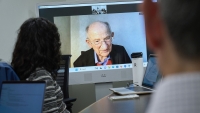Remote and In-Person Training

Balancing Community Building and Accessibility across Our Training Programs
Our training policies aim to strike a balance between the value of immersion and community building that in-person work fosters and our goal of making advanced training in psychoanalysis and psychoanalytic therapies available to a diverse group of clinicians with demanding schedules.
Classes
Our numerous training programs have diverse goals. Accordingly, we have arrived at different solutions regarding classroom teaching across our range of programs.
Adult Psychoanalysis
- All Monday classes are taught in person, and all Thursday classes are taught over Zoom.
- The Training Committee, in dialogue with candidates and faculty, will continue to evaluate possible solutions to offering remote access in limited circumstances on Mondays while preserving a robust and reliable in-person learning experience.
Child, Adolescent, and Emerging Adult Psychoanalysis
- The adult curriculum for child trainees will be taught as above.
- Currently, the Thursday evening child analysis courses are taught remotely. As a collaboration with our colleagues at NYPSI and PANY, the program’s plans for 2024-25 are still pending.
Psychology Externship
- Externs’ classes are taught within the adult psychoanalysis program and will follow that program’s policies, as indicated above.
Adult Psychodynamic Psychotherapy Program (PPP)
- This program’s classes will remain fully remote.
Transference-Focused Psychotherapy Program (TFP)
- This program’s classes will remain fully remote.
CAPE-Analyzing and Supervising Candidates (CAPE-ASC)
- This program’s classes will remain fully remote.
Child and Adolescent Psychodynamic Psychotherapy and the Parent Infant Program (CAPP and PIP)
- PIP classes will remain fully remote through June 2025, while CAPP classes will be taught in person, except for joint PIP/CAPP classes taught over Zoom.
- A new policy may be arrived at for the September 2025 entering classes.
Psychoanalytic Fellowship and Why Psychoanalysis
- These programs will remain fully in-person, without a remote option.
Psychoanalytic Studies Program
- This program’s classes will remain fully in-person.
Affiliate Scholars Program
- Affiliate Scholars are taught within the adult psychoanalysis program and will follow that program’s policies, as indicated above.
Trainees’ Clinical Work, Personal Analyses, and Supervision across all Center Training Programs
From an educational and administrative standpoint, with regard to trainees’ clinical work, personal analyses, and supervision, the Center does not distinguish between work conducted in person and that conducted by telephone or video platform. We expect our graduates to continue to conduct clinical work in person and remotely throughout their careers and strongly encourage trainees to gain experience in both modalities during their time with us.
Choosing Between In-Person Meetings And Teleanalysis
The process of deciding how to meet can be complex, and we encourage all members to approach it with the depth of thoughtfulness characteristic of their analytic work in general. In particular, we recommend the following:
- The wish to work via teleanalysis should be respected. Treatment should take place through teleanalysis unless and until both people are fully comfortable meeting in person.
- These decisions may need to be revisited over time as the analytic pair learns more about the implications of their choice through experience.
- Safety and accessibility concerns may be considered in the broader context of balancing costs and benefits. Candidates, their patients, and their analysts should explore what they perceive as the similarities and differences between teleanalysis and in-person work in their treatment.
- A wish to continue working via teleanalysis should not be approached purely as a resistance to the treatment. As with any issues in a psychoanalytic treatment, there will be conscious and unconscious meanings at play for both the training analyst and analysand. These issues can be explored while working in the preferred modality.
- In arriving at a decision regarding remote and in-person work, we should be mindful that power dynamics are always operative and thoughtfully examine our motivations, such as the wish to please the other.
- The analytic pair should consider continuing teleanalysis on a regular or intermittent basis if they feel teleanalysis is more beneficial to the candidate overall.
- The reduction in commuting offered by teleanalysis can have profound effects on the earning potential of trainees, the accessibility of training, and the quality of life of analysands and analysts alike. These advantages go beyond mere convenience and deserve to be carefully weighed in consideration of the treatment modality of choice.
- The Center’s consulting analysts (Drs. Berger, Chriss, and Kravis) are available to provide consultations to candidates regarding their personal analyses in situations where these issues can not be resolved internal to the treatment.
Behind These Policies
These policy changes derive from the findings of several in-depth surveys of the Center’s faculty and trainees regarding the experience of emergency remote training at the Center and follow extensive discussions among members of the Training, Executive, and Steering Committees. Seventy-nine percent of candidates and sixty-four percent of faculty responded to the surveys, giving us a detailed view of the strengths and weaknesses of the remote training experience and of our members’ needs and preferences for the months to come.
Importantly, we learned that:
- Most candidates felt the switch to remote training had not diminished their ability to learn,
- Most also felt the switch had enhanced their ability to fit training into their lives, meet their other responsibilities, and earn an income,
- On the other hand, most candidates felt their closeness with classmates and sense of membership in the Center community had suffered from the switch.
- When asked what type of classes they would prefer once they felt safe returning to in-person training, just under two-thirds of candidates voiced a preference for either all remote classes, remote classes only with one or a few in-person gatherings throughout the year, or a mix of remote and in-person classes in which more classes were remote.
- Only four percent of candidates preferred hybrid classes, with some students in person and some remote.
- Faculty responses showed that they considered remote classes to be adequate.
- Most faculty favored a mix of in-person and remote classes.
Regarding remote supervision, candidate responses strongly favored continuing that option beyond the pandemic.
- On every aspect of supervision we asked about, from feeling supported by the supervisor to the depth of the experience, candidates felt that remote supervision was as good or better than in-person work.
- Eighty-three percent of candidates who had experienced both in-person and remote supervision preferred remote.
- Ninety-six percent of candidates stated that, once they felt safe returning to in-person supervision, they would like to continue remote supervision, either exclusively or in combination with in-person supervision.
- Faculty responses endorsed the adequacy of remote supervision and expressed a preference for a mix of remote and in-person work beyond the pandemic period.
